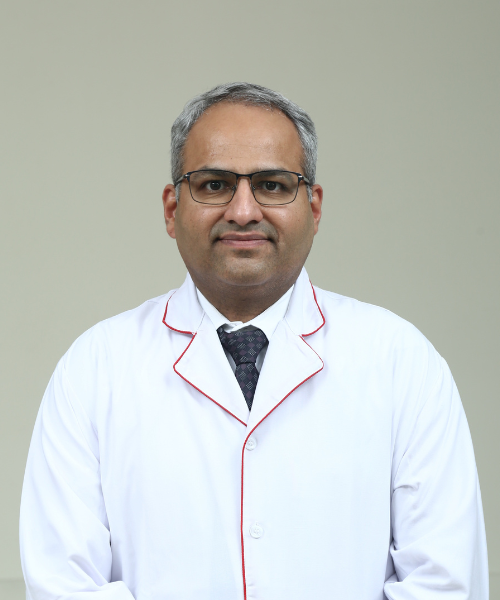Home » Speciality » Medical Oncology
MEDICAL ONCOLOGY:
BEST CANCER TREATMENT IN INDIA
to reliable cancer treatment in India.

Why choose Wockhardt Hospitals
for Cancer Treatment?
The successful establishment of Wockhardt Hospitals is the result of a 50-year legacy of healthcare and innovation nurtured by Wockhardt Ltd, the 5th largest pharmaceutical and medical institution in India with a presence in 20 countries worldwide.
The Department of Medical Oncology at Wockhardt Hospitals provides adults and children with solid tumors and blood cancer with comprehensive care in diagnosing and treating their conditions. In addition to medical, surgical, radiation therapy, and bone marrow transplant, the department offers a full range of clinical oncology specialties. In order to provide all-inclusive cancer treatment in India to people of all ages, our team of experts is extremely skilled at diagnosing the most complex cases, staging the disease, administering medications, administering radiotherapy, or performing surgeries using state-of-the-art technology. Our department’s oncology and hematology specialists, who are well-known, have the most advanced training, knowledge, and experience in the treatment of cancer in all forms and stages.
Renowned Oncologists
at Wockhardt Hospitals
- Mumbai Central
- Mira Road
- Nagpur
- Rajkot
What is Cancer?
Cancer is a disease in which a few body cells grow out of control and spread to other parts of the body.
The human body is made up of billions of cells. They grow and multiply through a process called cell division to form new cells when necessary. When cells become old or damaged, they die, and new cells are formed. When this orderly process disrupts, abnormal or damaged cells multiply and grow uncontrollably. It is possible for these cells to form lumps of tissues called tumors which can be cancerous. The spreading of cancerous tumors can lead to new tumors forming in other regions of the body, as well as the invasion of nearby tissues. Unlike malignant tumors, benign tumors do not spread or invade nearby tissues.
Among the world’s leading causes of death, cancer is the second most common. Fortunately, cancer screening, cancer treatment, and prevention have helped improve survival rates for many types of cancer.
What are the Signs and Symptoms of Cancer?
Cancer symptoms vary based on where the cancer is, how big it is, and how much it affects nearby tissues and organs. Numerous indications of cancer may be similar to those of other, milder ailments. Some of the signs and symptoms that may be caused by cancer can include:
- Excessive tiredness that doesn't improve with rest.
- Unexplained decrease in body weight by 10 % or more.
- Loss of appetite , problem swallowing, stomach pain, or nausea and vomiting.
- Pain, especially new or unexplained, does not go away or gets worse.
- Unexplained, unusual bleeding or bruising.
- New onset of lump in body.
- Hoarseness of voice.
- Persistent cough.
- If you suddenly feel anemic, this could be a sign of colon cancer.
- Skin changes such as yellowing, darkening, or redness of the skin, non-healing wounds, or changes in existing moles.
- Altered bowel habits.
Causes of Cancer
Cancer is a complex disease & causes are multi-factorial. It occurs when genes that regulate cellular functions undergo mutations and generate anomalous cells that undergo division and proliferation, ultimately disturbing the normal functioning of your body. Experts approximate that between 5% to 12% of all malignancies are brought about by genetic mutations that are passed down through generations and cannot be regulated. More frequently, most cancers take place as acquired genetic mutations, which take place over the course of your life. Medical researchers have recognized numerous threat elements that trigger your danger of developing most cancers.
Stages of Cancer
Stages I through IV comprise the majority of cancer types and types. Stage 0 (zero) is also assigned to certain cancers. The categories for cancer stages are explained in general here.
Stage 0: Cancer is described in situ (or in place) in this stage. Cancers at Stage 0 remain where they first appeared. They are not present in any adjacent organs or tissues. Many times, cancer at this stage may be cured. Most of the time, oncology surgery can remove the entire tumour.
Stage I: At this stage, the cancer generally hasn’t spread much into the surrounding tissues. Furthermore, it hasn’t reached the body’s lymph nodes or other areas. A common term for it is early-stage cancer.
Stage II: Cancer has advanced, and the tumour has grown larger but remains within the original organ or tissue. It may have spread to the nearby lymph nodes. Treatment options expand to include surgery, radiation, chemotherapy, or a combination.
Stage III: Cancer is more advanced, potentially involving larger tumours and/or spread to regional lymph nodes and surrounding tissues. Treatment becomes more intensive, often combining surgery, radiation, and chemotherapy.
Stage IV: At this point, the cancer has progressed to other bodily organs or regions. It is sometimes referred to as metastatic or advanced cancer.
It’s important to remember that these stages are general classifications and may not perfectly capture the nuances of each cancer. Additional factors like tumour grade, type, and individual health play a crucial role in determining prognosis and treatment plans.
Cosmetic or plastic surgery, when planned and done right, can have a lasting impact on one’s external appearance. One of the most important things to consider before cosmetic surgery is the motive behind the procedure. It is important to also be clear on the expectations and aspects to be changed and then talk to our specialists.
Common Medical Tests
to Diagnose Cancer
If your medical oncology doctor feels that a more thorough examination is needed due to your prolonged symptoms, he will likely suggest a variety of diagnostic tests . Cancer may be indicated by either high or low levels of certain markers in the body. Therefore, lab tests that measure these substances in your blood, urine, and other body fluids can help your doctor make a diagnosis.
It’s important to remember that these tests don’t necessarily indicate that you have cancer. You should wait for the result to decide what would be your next step in the treatment of cancer.
These are some of the standard tests that can identify cancer:
- Complete blood count (CBC)
- Blood protein testing
- Tumor marker tests - Prostate-specific antigen (PSA) for prostate cancer. Cancer antigen 125 (CA 125) for ovarian cancer, Alpha-fetoprotein (AFP) for liver cancer.
- Circulating tumor cell tests
There are other tests which are as follows-

- Biopsy
- Magnetic Resonance Imaging (MRI)
- Computed Tomography
- Positron Emission Tomography
- X-Rays
- Mammography
- Bone Scintigraphy
- Iodine Meta-Iodobenzylguanidine (MIGB)
- Colonoscopy
- PET-CT
- Pap Smear Test
- Endoscopic ultrasound
- Bone Marrow Examination
- Sigmoidoscopy
- Breast cancer screening
- Upper gastrointestinal series
- Cystoscopy
- Immunohistochemistry
- Mamma Print
- Mediastinoscopy
- Urine Cytology
- Virtual Colposcopy
Genetic Testing – Cancer can occur when a single gene is mutated or when a group of genes that work together is mutated. If a person’s biological parents passed on cancer-related genes to them, they might have a greater likelihood of getting cancer. Your doctor may advise genetic screening or testing for cancer if you possess a type of cancer that is passed on genetically. Genetic testing could be done in order to create a cancer surveillance pattern that focuses on particular genetic syndrome. Gathering the results from the tests, they use that information to formulate a diagnosis.
For many tests, it is possible to get normal results even if you have cancer. Even if you are healthy, it is possible to get results outside the normal range. Taking the results to a specialist, comprehending the situation, receiving a diagnosis, and classifying the type of cancer can undoubtedly alleviate some of that stress and anxiety and help you receive the best cancer treatment.
Treatments for
Cancer
Cancer treatment may be difficult for the patient as well as the medical expert team. Nonetheless, either separately or together, the following oncology treatment methods will be a part complete course.
Chemotherapy – Cancer cells can be eliminated by employing medications during chemotherapy cancer treatment. It also operates in a pattern creation that inhibits or slows the development of malignant cells, which have the characteristic of rapidly dividing and renewing.
There are three types of chemotherapy treatments available:
- Neoadjuvant Chemotherapy
- Adjuvant Chemotherapy
- Palliative intent therapy
Immunotherapy – Immunotherapy is a method for fighting cancer that has revolutionized cancer treatment. Immune cells in the body are triggered to attack cancer cells through this process. By strengthening the body’s natural defenses, the malignant cells can be destroyed with the help of this therapy.
Targeted Therapy – Unlike traditional chemotherapy, targeted therapy specifically targets cancer cells an helps eliminate them to reduce cancer burden. The treatment prevents cancer cells from growing and migrating to other human organs.
Hormones Therapy – Hormones help with the growth and development of specific cancer forms. In essence, this means that these specific cancers are hormone-dependent or hormone-sensitive. Hormone treatment can operate as a blocking or preventative strategy by employing medications, preventing the hormones from growing or generating new cancer cells.
Radiation Therapy – High-powered radiation beams are focused on the tumor in the body during radiation therapy. Three different methods of radiation therapy:
- External Beam Radiation Therapy
- Internal Radiation Therapy
- Stereotactic Radiosurgery and Ablative Radiotherapy
For those with cancer, further therapy options include:
- Surgical Oncology
- Bone Marrow Transplantation
The concerned doctors and support team at Wockhardt Hospitals will be there for you every step of the way as you proceed with your oncology treatment.
Types of Cancer
There are several types of cancer, and each has a unique diagnostic and treatment approach. These are a few of the most common cancers:
- Breast Cancer - This refers to aberrant cell proliferation in the breast.
- Gastrointestinal Cancer - The gastrointestinal system (GI tract) and other associated organs, including the stomach, liver, gallbladder, pancreas, large and small intestine, and anus, are all included in this category of cancer.
- Thoracic cancer - A kind of cancer that starts in the lungs or surrounding organs is called thoracic cancer.
- Urologic Cancer - Both males and females who have this sort of cancer will have organ and structural changes to their urinary systems.
- Gynecologic Cancer - Ovary, Uterine, and Cervix.
- Head and Neck Cancer - Head and neck cancer refers to abnormal cell development in the salivary glands, sinuses, larynx, mouth, nose, and throat.
- Blood Cancer - Blood secretion is negatively impacted by hematology-oncology or blood cancer since the blood-producing cells don't work properly. As the bone marrow is the main site of blood synthesis in the human body, this form of cancer typically targets this tissue.
FAQs on Cancer Treatment in India
Q. Which is the best oncology hospital in Mumbai?
Q. How long can a cancer patient live?
An average five-year survival rate is used to calculate cancer survival rates. Even after five years, cancer might still reoccur. Long after they have been identified and treated, certain cancers might return. There may be very little risk of a recurrence of some cancers if they have not returned five years after the first diagnosis.
Q. Can cancer be fully cured?
Whether or not a person’s cancer can be cured depends on the kind and stage of the disease, the kind of treatment they can receive, and other variables. The likelihood of curing different types of cancer varies. However, different treatments are necessary for various cancers.
Q. Is it possible to continue working while undergoing cancer treatment?
Many individuals who are receiving cancer treatment can still work. Patients may continue to work throughout the first few weeks of treatment but must take time off owing to adverse effects at the end.
Q. How effective is cancer treatment in India?
Surgery works as the best alternative for oncology treatment if cancer has spread to another area of the body. It, however, may occasionally result in a cure for some cancer types and help patients live long life.
Q. How long does cancer treatment in India take?
Chemotherapy treatments typically last between three and six months; however, they might last longer or shorter. One or more chemotherapy medications will be used in the treatment.
Q. Is Oncology treatment affordable at Wockhardt Hospitals?
One of the top medical facilities in India for cancer care and oncology conditions is Wockhardt Hospitals. Typically, the cost of cancer treatment is pretty reasonable.You can get in touch with one of our medical professionals and get all the details related to the inclusive cost and insurance details.
































